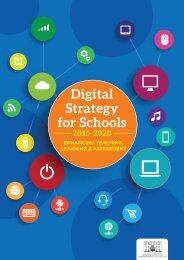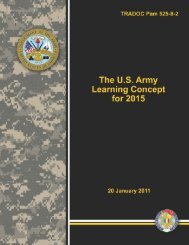Digital Strategy for Schools
TKmc0
TKmc0
You also want an ePaper? Increase the reach of your titles
YUMPU automatically turns print PDFs into web optimized ePapers that Google loves.
DIGITAL STRATEGY FOR SCHOOLS – ENHANCING TEACHING, LEARNING & ASSESSMENT<br />
The 75 participants demonstrated enormous clarity and insightfulness on the use of in<strong>for</strong>mation<br />
and communication technology both in schools and in their daily lives. Young people have a mature<br />
perspective on how technology can be of benefit <strong>for</strong> living, learning and working in the future. Their<br />
perception is that currently, technology is something that is more relevant to their social lives and<br />
is of limited relevance in school. However, they have some clear ideas as to how ICT can benefit<br />
their education. Their main recommendations of relevance to the <strong>Digital</strong> <strong>Strategy</strong> <strong>for</strong> <strong>Schools</strong> can<br />
be summarised as follows:<br />
1. Technology needs to become more relevant to learning in school. Currently, technology is<br />
something that is more relevant to their social lives and is of limited relevance in school.<br />
2. Provide access to learning resources on the internet as these are often more up to date than<br />
those provided in textbooks or easier to understand than what has been presented by the<br />
teacher.<br />
3. Use ICT to open up new <strong>for</strong>ms of learning and collaboration and provide greater flexibility <strong>for</strong><br />
students with different styles of learning.<br />
4. Provide cloud based services such as email, online resource banks, organisation of teaching<br />
and learning resources, and the administration of homework.<br />
5. Use ICT to record their work on an ongoing basis, accessing it at any time, and using ICT as their<br />
student journal.<br />
6. Use ICT <strong>for</strong> administration including roll call in each class and the assignment of homework and<br />
homework feedback.<br />
7. Teachers should have access to CPD on how to integrate ICT in the classroom.<br />
8. All teachers in a school should use ICT in their teaching.<br />
9. Use ICT to help students with specific learning needs such as dyslexia or dyspraxia.<br />
10. Raise awareness of technology downsides such as plagiarism, distraction, over reliance on<br />
functions such as spell and grammar check, cyber bullying and access to inappropriate material<br />
and enable students to deal with these.<br />
11. Help filter out unreliable or inappropriate sources and content.<br />
EXCITED Conference<br />
A series of 10 focus group workshops with young people took place on 29th May, 2014 to coincide<br />
with the EXCITED – The <strong>Digital</strong> Learning Festival held in Dublin Castle. The workshops examined<br />
the following key questions:<br />
1. Why should we use technology in our classrooms?<br />
2. What do you think is the most useful piece of technology to assist you in your learning at school<br />
and at home?<br />
3. If you bring this technology to school, how would you use it to its full potential to learn?<br />
4. How do you think schools/teachers should assist you in finding all the in<strong>for</strong>mation you need?<br />
5. How would you like to present your work to demonstrate your learning?<br />
6. How do you think teachers should use technology in their teaching?<br />
54




